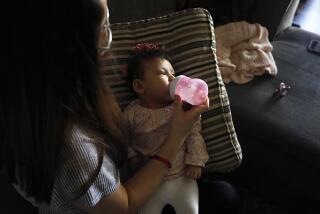China says baby formula did not cause early puberty in infant girls
- Share via
Reporting from Beijing — In an attempt to head off a mounting public relations crisis, the Chinese government said locally made milk formula is not what caused early puberty in baby girls as young as 4 months.
China’s Ministry of Health said Sunday that there was no link between the infant formula made by the Qingdao-based company Synutra International and reports by families using the product that their infant daughters had grown breasts.
After testing 73 samples of formula from Synutra and other international and domestic brands, the ministry concluded that the milk powder displayed normal levels of the hormones that might have caused the early development.
Three families in the central province of Hubei said this month that their daughters grew breasts after drinking formula made by Synutra. The infants had levels of estradiol and prolactin, hormones that stimulate the production of breast milk, that were as high as those in adult women, according to the Beijing-based Health Times newspaper.
One father in Beijing recently said his 1-year old daughter had grown breasts and was experiencing vaginal discharge.
In the wake of the 2008 scandal over melamine in baby formula that sickened thousands of children and killed at least six, Chinese authorities are eager to soothe the nerves of parents. Despite assurances from health authorities, food safety experts and families are still concerned that formula from Synutra, as well as other brands, is unsafe.
The investigation, which was conducted with nine experts on food safety, endocrinology and pediatrics, concluded that the Hubei cases were a result of “minimal puberty,” or the early onset of puberty that can happen in girls before the age of 2 and boys of up to 6 months old.
“Breast development in female infants is not rare clinically,” Liang Li, an endocrinologist at the Zhejiang University School of Medicine, told the Global Times, an English-language newspaper sponsored by the Chinese government, after the government issued its statement Sunday.
Citing the fact that the infants in Hubei did not show abnormal bone growth or other symptoms, and that their hormone levels were now normal, Health Ministry spokesman Deng Haihua said, “Breast development in the three baby girls in Hubei has no link to Synutra milk powder.”
Ben Embarek, a food safety expert with the World Health Organization, said health experts need to investigate whether even low levels of hormones in the formula could affect infants who generally rely on it as their main source of food. Embarek said the results of the analysis of the babies in Hubei also may have been affected by the fact that the parents stopped using the formula days or weeks before the tests.
Parents who have flooded doctors’ offices to have their children checked are wary of authorities’ remarks.
“I’ve heard the statement from the ministry, and it makes me feel helpless,” said 28-year-old Wang Gang, who took his 1-year-old to Beijing Children’s Hospital after noticing strange liquid on her underwear. Wang said the doctor evaluating his daughter was so surprised at the level of hormones present that he asked if it was possible the child had accidentally swallowed birth control pills.
Wang said other parents are also dissatisfied with the answers coming from doctors and the Health Ministry. He’s started an online group on QQ, a popular Chinese instant messaging forum, where he and more than 100 other families debate how they can independently test the samples of infant formula and whether they should start raising sheep to ensure their own safe supply of milk for their children.
“There’s no way I’m using milk formula, whether it’s from China or abroad,” Wang said.
Kuo is with The Times’ Beijing Bureau. Researcher Tommy Yang contributed to this report.
More to Read
Sign up for Essential California
The most important California stories and recommendations in your inbox every morning.
You may occasionally receive promotional content from the Los Angeles Times.












